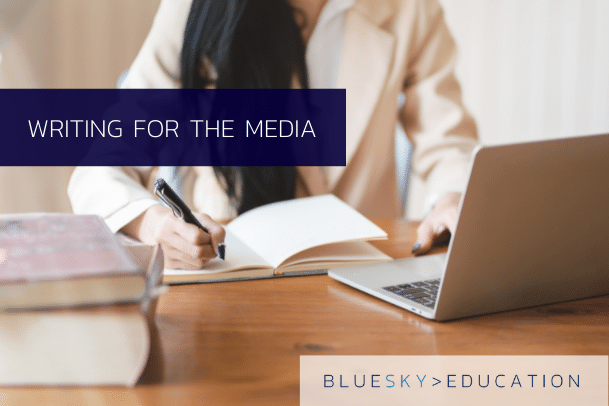
How to attract international students to online degrees
We live in a world that is becoming more and more interconnected every day. This has never been more apparent than in the business education sector. Now more than ever before, students are willing to travel all over the world to study on the best programmes at the best business schools. This makes the business education sector well-and-truly a global marketplace. And with that, it makes it an incredibly competitive marketplace!

Crisis communications for business schools during the coronavirus pandemic
I think it would be fair to say that right now we are faced with the one of the greatest issues of our generation: COVID-19.

How to attract students to your colleges using PR
One of the key aims of your institution is to attract students right? But how do you that successfully? Of course, there are lots of ways you can do this. But here at BlueSky Education we think using stories to do this, might be your secret weapon.

How PR can attract new students
There are a vast number of reasons as to why business schools want, and need, to engage in PR. Whether it is to highlight some of the ground-breaking academic research from their professors, announce a new programme at the school or promote their faculty’s expertise – all of which are enhanced and have more impact through the use of PR.

AMBA and BGA Excellence Awards and Gala Dinner – BlueSky Education’s take on the night
It was a throwback to the 1920s this year at the AMBA and BGA Excellence Awards and Gala Dinner. The event was hosted on February 7th at the Sheraton Grand Park Hotel in London with over 200 business school leaders from the business education sector, as well as category finalists, judges and members of the media.

Why cultural diversity in the classroom is an asset
The world is bursting with people from different cultures; identities formed from the environment we grew up in, our family, friends, and where we were born, among other things. It influences how we engage with the world, the perspectives we take, and the expectations we have. Culture can influence what we consider success in our careers, how we understand music, and even define how we see colours. Every single one of us has a culture, and most of us have identities built from multiple cultures; whether it’s our race, ethnicity, religion, or nationality.

Why 2020 is the year you should be targeting new markets
As we enter a new decade, the political climate is arguably more turbulent than ever. The UK has officially left the European Union, which has left everyone in a “transition” period but not everyone really knows what it means, and in terms of education, it’s putting off some EU students from choosing the UK to study.

How business schools can use Twitter to maximise ROI from PR
Within the last 15 years, social media has completely infiltrated our lives – both personally and professionally. From a business perspective, it could be argued that Twitter is the most effective platform to engage with.

How to maximise your return on investment from PR
It’s no secret that the public relations industry has a challenge when it comes to communicating how it directly impacts the bottom-line. But what if you, the client, could maximise your return from the work your PR agency does for you?

What sort of university PR return on investment can I expect?
What are the results of PR efforts for universities? If you are investing money in a service or product, you will want to know whether the investment is worth the time and money. For example, if you’re investing a lot of money in a house, it will only be worth it if the house increases in value. The results of this type of investment is easy to see – an increase in value means it was a good investment.

How can you measure the business school PR return on investment?
Worthwhile investments must offer a return. Whether it is in a specific stock you have a hunch about, funding a business you like the idea of, or purchasing a property – you are always looking for results from that investment. But, in most of these, you are easily able to quantify whether your risk paid off, through stats and figures – did the stock you invested in go up? Did the company you invest in increase its value? Did the price of your house increase? Investing in public relations, however, can be a little more difficult to quantify in terms of return on investment.

How to get coverage in political press
Political press is a broad branch of journalism, and every day we are infiltrated with political news – in print, on the TV, radio, and of course our digital devices. Indeed, the variety of political media outlets and publications reflect the huge variation of political opinion across the globe.

How to get coverage in finance press
Financial news outlets attract some of the biggest readerships and are amongst some of the most well respected in the world, with the Financial Times, Bloomberg, The Economist and Reuters amongst some of the most popular.

How to get coverage in HR press
Human resources is an interesting topic. However, many may feel they can’t relate to the role of a HR Director, or that HR decisions have no impact on them – but, this is not the case. Every single company in the world has to have a HR professional, or at least have to make decisions that would fall under the HR function.

How to get coverage in tech press
Technology is a massive topic, in the last decade it has moved from the fringes to mainstream media. This is because it has increasingly become integrated in businesses and industries so the media has had to adapt to the changing landscape. However, because tech is so popular in the media it can be very difficult to get coverage.

How to get coverage in education press
Nowadays, achieving coverage for your business school or university is a challenge to say the least.

Public Relations vs. Propaganda, Marketing, and Publicity
PR features in a lot of movies and TV shows, albeit in a dramatized and sometimes inaccurate way; Scandal, Sex and the City, and House of Cards all portraying various aspects of PR in a way that shapes what the general public think PR actually is. In fact, when I tell my friends that I work in Public Relations and what that involves, I am often met with responses similar to the following:

Should out-of-working hours e-mails be banned? - International PR
You may have seen an interesting research study hit the headlines last week. Researchers from the University of Sussex released findings from a study into out-of-work hour e-mails, which suggested that banning staff from accessing their work emails outside office hours could actually do more harm than good to employee well-being. These findings, of course, featured heavily in the press, sparking huge debate not only in the comments section of the Daily Mail (what doesn’t?), but on social media and, I imagine, many workplaces – whether they be open-plan, virtual, remote or co-working.

Why is it important to promote academic research in the media?
There’s an old saying: "Advertising is what you pay for, publicity is what you pray for” (Helen Woodward, 1938). I couldn’t agree more.

PR lessons from the life and times of Boris Johnson
Our Prime Minister, (I can’t believe I’m saying this) Boris Johnson, has had a challenging few weeks to say the least. He’s currently engulfed in a PR nightmare for the ages, and every day the situation for poor Boris seems to get worse. However, I don’t really feel sorry for him, as he’s brought it all on himself. He has successfully become one of the most divisive political figures of the last 30 years, and he’s only been in office since the end of July.

Why networking events are important in Business Education PR
Life is busy, and it’s very easy to come into work and go about your daily routine, Monday to Friday, sitting at the comfort of your desk. Drafting press releases, writing articles, and sifting through the vast amount of emails you may receive every day is time consuming, and it’s therefore understandable why you may ignore an invitation to a conference or networking event.

How to engage with journalists to get the best coverage
The media is constantly changing as a result of digitalisation. The internet has become the go-to news platform, meaning getting news is quicker and easier than ever. As a result, journalists are now busier than before, so as a PR professional it’s even harder to get a response. The relationship between journalists and PR professionals is key to being successful in PR, our job is to get results and the only way this works is if journalists cooperate with us.

From Pitch to Publication: What to do when your pitch gets a yes
You have finally written the perfect pitch; catchy headline, fascinating content, and sent it out to a plethora of relevant journalists. Then, a journalist responds, interested in featuring a piece from your client. But what do you do next?

How to structure a press release based on academic research
Producing innovative and influential academic research is one of the best ways a business school can make itself stand out in a crowded market. In fact, academic research is now so important to a business school’s brand that leading business education news site, Poets & Quants, recently created a new ranking selecting the top 100 business schools for academic research in the world. And it’s no surprise that globally known brands, such as Harvard, Wharton and NYU Stern, finished at the top for academic research too. It’s clear that both a strong brand and strong, impactful academic research go hand in hand in the business school world.

How to work effectively with media in Germany
One of Europe’s largest countries, Germany is located in north-central Europe and has a population of more than 80 million people. At its spiritual heart is the capital city of Berlin – just one of the draws which bring millions of visitors to the country each year. And it’s a country known for its people’s devotion to hard work, who place a high value on leisure, culture and a free press, and enjoy the benefits of life in a liberal democracy that has become ever more integrated with and central to a united Europe.

How to effectively work with media in the UK
The UK has a vast media landscape With a population of over 66 million, and over 100 daily and 450 non-daily newspapers, the UK is a nation of avid media consumers. Dating back to the 1620’s, the UK press has extensive history, and continues to be one of the most respected, diverse, and widely read national press across the globe.

How to work effectively with media in The Republic of Ireland
The Republic of Ireland occupies 26 of the 32 counties which make up Ireland, Europe’s second-largest island, with one-third of the country’s entire population residing in the greater Dublin area. Although it shares an island and a border with Northern Ireland, a part of the United Kingdom, it is not itself a part of the UK. Therefore, the Republic of Ireland has its own unique media landscape with a massively developing technology and business sector, making the Emerald Isle an up and coming destination for many international higher education students.

How to effectively work with media in the US
With a population of just over 329 million people, making it the third most populous country in the world, the USA is clearly going to be a key media target for any institution. But, more importantly, according to GMAC’s 2018 Applications Trends survey, 140,000 out of an overall 290,000 business school applications last year came from US-based applicants – over three times the size of applicants in Europe alone.

How to work effectively with media in France
France is at the heart of Western Europe. Historically and culturally among the most important nations in the Western world, France has played a significant role in international affairs, with former colonies in every corner of the globe, and remains one of the world’s leading industrial powers. It’s home to around 66 million people that support the EU's second largest economy and enjoy reading some of the world’s most respected media publications.

How to work effectively with media in India
India is the second most populated country in the world. It has an astounding diversity of religions, languages and cultures. Along with this, India has a flourishing media scene, with thousands of outlets operating in multiple languages. The mainstream media has more freedom that even before. The use of social media has grown exponentially with the increase in availability of technology. As a result, the media industry in India has expanded tremendously, so now is the time to focus on public relations and secure some great coverage.

How to work effectively with media in China
China is home to an estimated 1.3 Billion people, is the world’s second largest economy and has one of the one of the largest media markets in the world. Unsurprisingly, being able to tap into it is a highly appealing prospect for any higher education institution.

How PRs should prepare for business education conferences
Business education conferences can be very productive, but they can be a stressful experience if you do not prepare properly.

How to hire a PR agency – advice for universities
Whether it’s for a short-term project or long-term support, are you considering hiring a PR agency? If so, how’s the best way to go about this as a university?

How to ensure your content has as much impact as possible
There are no two ways about it, creating great, insightful content for your institution is always a good thing. However, it is extremely difficult to measure how much of real impact each piece of content actually has on the reader and whether or not this has a long-lasting effect.

How to write a viral press release on academic research
Its trendy at the moment to say the ‘press release is dead’. And while I would agree that the media industry has gone through a dramatic shift in recent years, that doesn’t necessarily mean the demise of the press release. The problem is there’s a lot of wordy press releases sent to the wrong people which ultimately end up in the deleted folder of journalist’s emails. I think it’s fair to say that press releases have a PR problem. However, if it’s done right, the trusty press release is still a quick and effective way to target relevant journalists with just the information you want.

7 steps to securing meetings for your faculty abroad
Whether accompanying MBA students on international study trips, attending overseas recruitment fairs or speaking at industry events, such excursions provide the ideal opportunity to raise the profile of their school on a wider scale by engaging with local media.

International PR offices – are they needed for international coverage?
You’re looking for a PR firm to help out with your international PR efforts and come across a firm that states “we have offices based in New York, London, Hong Kong, Paris and Berlin, in order to penetrate our key markets in the most effective way possible”.

Why storytelling is vital to Business School PR
Why we tell MBA stories to increase applications for Business Schools Storytelling is often considered vital for human survival. It’s how we have communicated since we were sat in caves – I think it is just as important now as it was then. And in the world of PR there often needs to be an emphasis on storytelling over selling.

How to attract faculty
Business schools and universities are successful for a whole host of reasons – their longevity, their location, their contribution to the society around them, but their life blood is the quality of their teaching and research – and for this they need the best academics.

Return on Investment: How to Measure the Real Value of PR
Return on Investment. The crux of so many PR client meetings. Gone are the days of walking into a client’s office with a stack of newspapers that they’ve been featured in since the beginning of your contract; no longer can the value of PR be realistically measured by how much the table shakes when you drop that stack of coverage. So, how can it be measured?

How do you differentiate your business school from others?
In November, I had the pleasure of hearing from and spending time with representatives from some of Europe’s best and well-known business schools, at the GMAC European Conference in Berlin.

Who are you pitching to?
When sending a pitch to a journalist, what’s the first thing you need to check before hitting send? Checking your information is accurate perhaps? Making sure it’s short, swift and to the point? Making sure you’ve spelled their name correctly?

Why academic writing doesn’t work for the media
The appetite for academic research in the media is huge. Studies and statistics lend credibility to comment pieces and provide great insight into current trends. But it’s not quite as straight forward as throwing dissertations at journalists!

3 reasons why travel is key for good PR
Hans Christian Andersen once famously said that ‘to travel is to live’. And while my grandmother never left the British Isles – she was genuinely even afraid to cross big bridges near her home in the countryside – we now live in a world with sprawling cities, where we regularly board planes, cross borders and travel the world.

Is hiring a PR agency right for your business school?
As a specialist PR agency in the business education market, there are plenty of reasons why schools choose to bring us on board. If you’re considering hiring a specialist consultancy like us too (or you’re just here out of professional curiosity) then it’s probably time to look more closely at what having an agency’s support could achieve. With institutions having such wildly varying goals, here are a number of reasons why a business school might want to work with us: Raising the profile of a key member of faculty – perhaps the Dean of the business school or a renowned academic. Getting coverage in the press that hits both the quantity and quality mark can effectively boost a significant person’s profile. We often use the example of securing an op-ed for a professor in The Guardian that lead to him being inviting to speak at the World Economic Forum. Results like this speak for themselves. Boosting applications for certain programmes – are application numbers for your MBA lower than you’d like them to be? Get that course into the right press – show off your students, highlight that incredible alumni, position that academic lead – and watch the knock-on effect of climbing student application numbers. Appealing to quality students - Your EMBA not getting the quality of applicant that you really desire? Are you in need of better scholarship applicants? Placing articles within the right media outlets, like the Financial Times or The Economist, can attract a high calibre student. Numbers aren’t everything after all, getting quality applicants is vital.

3 PR fails of the week
This last week has provided a lot of PR fails - which have been so awful, they have literally made headlines themselves. Here are my top three. Melania Trump The first, and possibly the worst, PR fail is Melania Trump’s jacket. It’s fair to say that President Trump and the first lady have faced a lot of criticism, but somehow, I think wearing a jacket to visit a migrant child detention centre that says ‘I really don’t care, do you?’ is possibly one of the most insensitive things Melania could have done. Unfortunately for her, Melania Trump's apparently empathetic visit to the Mexican border is now completely overshadowed by the unempathetic message on the back of her jacket. Burger King Another embarrassing PR fail this week comes from Russian Burger King. Obviously seizing the opportunity to make headlines with the world’s media spotlight on Russia thanks to the World Cup, Burger King Russia decided to create a social media campaign offering free burgers for life to women who get pregnant by a football player. “Each will receive 3 million rubles, and a lifelong supply of Whoppers. For these girls, it will be possible to get the best football genes and will lay down the success of the Russian national team on several generations ahead. Forward! We believe in you!" Burger King in Russia have since apologised for the social media campaign. I would have thought that Burger King wouldn’t want to encourage Russia having a bad reputation for playing on sexist stereotypes, particularly in advertising, but this campaign really felt like something from the 1950’s.

To blog or not to blog? The benefits of blogging for business schools
There are more than 496 million blogs on Tumblr alone. Although this statistic may feel intimidating and evoke a sense of shouting into the void, business schools should actively try and engage with blogging. But why?

How to use social media for greater exposure of your media coverage
So, you secured a fantastic media opportunity for your institution and it has just resulted in a great piece of coverage, whether that’s print, online, or broadcast. How do you ensure that this coverage is generating the readership and getting the attention it deserves? Well, this is where social media comes in.

Why you should always meet your deadlines, and what to do when you don’t
Meeting deadlines is vital. It is not rocket science to see why this is such an important rule in PR.

Why a business school’s faculty is the best comms tool they have
The business education market is becoming increasingly crowded every year – with over 16,000 business schools in the world currently according to AACSB International – so you have the tough task of convincing students, corporate partners and faculty that your school is the right one for them.
